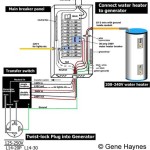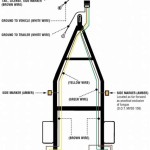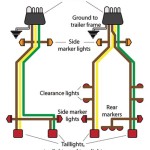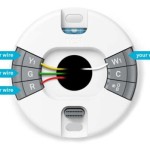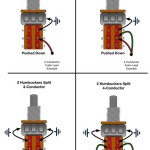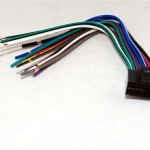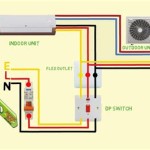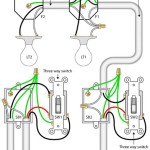A Trailer Plug Wiring Harness connects a trailer’s electrical system to the towing vehicle. Each wire in the harness has a specific color code that corresponds to a specific function. For instance, the white wire is for grounding, the brown wire is for taillights, and the yellow wire is for left turn signals.
Trailer plug wiring harnesses are essential for ensuring that the trailer’s lights, brakes, and other electrical accessories function properly. They provide a safe and reliable way to transfer electrical power between the towing vehicle and the trailer. Historically, the development of standardized color codes for trailer wiring harnesses has greatly simplified the installation and maintenance of towing systems.
This article will explore the different types of trailer plug wiring harnesses, their applications, and best practices for their installation and maintenance. By understanding the fundamentals of trailer plug wiring, you can ensure the safe and efficient operation of your towing system.
Trailer plug wiring harnesses are essential components of towing systems, ensuring the safe and reliable transfer of electrical power between the towing vehicle and the trailer. Understanding the key aspects of trailer plug wiring harnesses is crucial for proper installation, maintenance, and troubleshooting.
- Compatibility: Matching the right harness to the vehicle and trailer.
- Wiring: Color-coded wires for specific functions (e.g., lighting, brakes).
- Connectors: Types and configurations for different applications.
- Materials: Durability and resistance to corrosion and wear.
- Length: Sufficient reach between the vehicle and trailer.
- Accessories: Additional components like adapters and extension cords.
- Safety: Compliance with industry standards and regulations.
- Installation: Proper methods and techniques for secure and reliable connections.
- Maintenance: Inspection, cleaning, and repair to ensure optimal performance.
- Troubleshooting: Identifying and resolving common electrical issues.
These aspects are interconnected and influence the overall functionality and safety of the towing system. For example, using a compatible harness ensures proper electrical connections, while durable materials resist harsh environmental conditions. Regular maintenance, including inspections and cleaning, helps prevent problems and extends the lifespan of the wiring harness. Understanding these aspects empowers individuals to make informed decisions regarding the selection, installation, and maintenance of trailer plug wiring harnesses.
Compatibility
Compatibility between the trailer plug wiring harness and the vehicle and trailer is paramount for the safe and reliable operation of the towing system. An incompatible harness can lead to electrical malfunctions, such as inoperative lights, brakes, or turn signals, which can compromise safety and lead to accidents. Choosing the correct harness ensures that the electrical systems of the towing vehicle and trailer are properly interconnected, enabling the proper functioning of all electrical components.
Real-life examples of compatibility issues include using a 4-pin harness with a 7-pin trailer, resulting in limited functionality or no connection at all. Conversely, using a 7-pin harness with a 4-pin vehicle will leave three pins unconnected, potentially leading to electrical problems. Matching the harness to the specific vehicle and trailer ensures that all electrical functions are supported and operate as intended.
Understanding the importance of compatibility allows individuals to make informed decisions when selecting and installing trailer plug wiring harnesses. By choosing the correct harness, they can ensure the proper functioning of the towing system, enhancing safety and preventing potential electrical issues. Moreover, it enables the full utilization of all electrical features, such as brake lights, turn signals, and auxiliary power, enhancing the overall towing experience.
Wiring
Within the context of trailer plug wiring harnesses, the color-coded wires play a crucial role in ensuring the proper functioning of various electrical components. Each wire is assigned a specific color code to correspond with a particular function, enabling easy identification and connection during installation and maintenance.
-
Ground Wire:
The ground wire, typically white or black, establishes a common electrical reference point between the towing vehicle and the trailer. It provides a path for electrical current to complete its circuit, ensuring the proper operation of electrical components.
-
Tail Lights:
The tail light wire, often brown, connects the trailer’s tail lights to the vehicle’s electrical system. When the brake pedal is pressed, the tail light wire provides power to the trailer’s brake lights, indicating to following vehicles that the trailer is slowing down or stopping.
-
Turn Signals:
The turn signal wires, usually yellow (left) and green (right), connect the trailer’s turn signals to the vehicle’s flasher system. When the turn signal is activated, the corresponding wire sends power to the trailer’s turn signals, indicating the intended direction of the turn.
-
Reverse Lights:
The reverse light wire, commonly blue, connects the trailer’s reverse lights to the vehicle’s reverse gear switch. When the vehicle is shifted into reverse, the reverse light wire provides power to the trailer’s reverse lights, illuminating the area behind the trailer to aid in reversing maneuvers.
The color-coded wires in trailer plug wiring harnesses simplify the installation and maintenance process, ensuring that each wire is connected to its intended function. This standardization enhances safety by ensuring that all electrical components operate correctly, reducing the risk of accidents and electrical malfunctions.
Connectors
Connectors are crucial components of trailer plug wiring harnesses, providing the physical interface between the vehicle and trailer’s electrical systems. The types and configurations of connectors vary depending on the specific application and industry standards. Understanding the different types of connectors is essential for proper installation, maintenance, and troubleshooting of trailer plug wiring harnesses.
Connectors in trailer plug wiring harnesses are designed to withstand the rigors of towing, including exposure to moisture, dirt, and vibration. They are typically made of durable materials such as plastic or metal to ensure a secure and reliable connection. Different types of connectors are used for different purposes, such as 4-pin connectors for basic lighting functions and 7-pin connectors for more comprehensive electrical systems, including brakes and turn signals.
Choosing the correct connector type and configuration is critical for ensuring proper electrical connections between the towing vehicle and the trailer. Mismatched or improperly installed connectors can lead to electrical malfunctions, safety hazards, and reduced functionality of the trailer’s electrical components. Proper installation involves aligning the pins and sockets correctly and securing the connector to prevent accidental disconnection.
Understanding the types and configurations of connectors in trailer plug wiring harnesses enables individuals to make informed decisions during installation and maintenance. By selecting the appropriate connectors and ensuring proper connections, they can guarantee the reliable and safe operation of their towing systems, ensuring the proper functioning of lighting, brakes, and other electrical accessories.
Materials
In the context of trailer plug wiring harnesses, the materials used play a crucial role in ensuring durability, resistance to corrosion, and wear, factors that directly impact the reliability and longevity of the electrical connection between the towing vehicle and the trailer. These characteristics are particularly important considering the harsh operating environment that trailer plug wiring harnesses are subjected to, including exposure to moisture, dirt, road salts, and extreme temperatures.
-
Conductor Material:
The electrical conductors within the wiring harness, typically made of copper or aluminum, need to be resistant to corrosion to maintain proper electrical conductivity over time. Copper is often preferred due to its superior conductivity and corrosion resistance, while aluminum is a cost-effective alternative but may require additional protection against corrosion.
-
Insulation Material:
The insulation surrounding the conductors serves as a protective barrier against electrical shorts and damage. High-quality insulation materials, such as PVC or polyethylene, provide excellent resistance to moisture, abrasion, and chemicals, ensuring the integrity of the electrical connection.
-
Connector Housing:
The connector housing, which houses the electrical contacts and provides the physical interface between the vehicle and trailer, needs to be durable and resistant to corrosion. Typically made of plastic or metal, the housing should be able to withstand impact, vibration, and exposure to the elements without compromising the electrical connection.
-
Contact Pins and Sockets:
The contact pins and sockets within the connectors are responsible for establishing the electrical connection between the vehicle and trailer. These components should be made of conductive materials, such as brass or copper, and plated with corrosion-resistant materials like gold or nickel to ensure reliable electrical contact and prevent oxidation.
Durable and corrosion-resistant materials are essential for trailer plug wiring harnesses to withstand the rigors of towing and ensure reliable electrical connectivity. By choosing harnesses made with high-quality materials, users can enhance the longevity and safety of their towing systems.
Length
In the context of trailer plug wiring harnesses, ensuring sufficient reach between the vehicle and trailer is crucial for proper electrical connectivity and safe operation of the towing system. The length of the harness determines whether it can comfortably extend from the vehicle’s electrical socket to the trailer’s connection point, accommodating various trailer sizes and towing configurations.
-
Vehicle Socket Location:
The location of the electrical socket on the towing vehicle can vary depending on the make and model. Some vehicles have the socket mounted on the bumper, while others have it concealed behind a panel or under the vehicle. The length of the wiring harness should be sufficient to reach the socket without excessive .
-
Trailer Hitch Type:
The type of trailer hitch used can also influence the required length of the wiring harness. Different hitches have different mounting positions and clearances, which can affect the distance between the vehicle’s socket and the trailer’s connection point.
-
Trailer Size and Configuration:
The size and configuration of the trailer impact the length of the wiring harness needed. Larger trailers or those with unique configurations may require a longer harness to ensure a proper connection.
-
Maneuverability and Safety:
Sufficient length in the wiring harness allows for better maneuverability of the trailer, reducing the risk of accidental disconnection during turns or reversing. It also ensures that the electrical connection is not when the trailer is at its maximum articulation.
Choosing a trailer plug wiring harness with the appropriate length is essential for maintaining a reliable electrical connection between the towing vehicle and the trailer. It ensures proper functioning of lighting, brakes, and other electrical accessories, contributing to the safety and ease of operation of the towing system.
Accessories
In the realm of trailer plug wiring harnesses, accessories such as adapters and extension cords play a crucial role in extending the functionality and adaptability of these essential components. Adapters serve as intermediaries, allowing harnesses designed for one type of connection to work with different configurations of towing vehicles or trailers. Extension cords, on the other hand, provide additional length to the wiring harness, enabling it to reach connection points that may be farther apart than the standard harness length allows.
The inclusion of adapters and extension cords as accessories for trailer plug wiring harnesses addresses specific challenges and enhances the versatility of the towing system. Adapters overcome compatibility issues, ensuring that the electrical systems of the towing vehicle and trailer can communicate effectively, regardless of their respective plug configurations. Extension cords resolve the limitation of fixed harness lengths, allowing for greater flexibility in trailer positioning and accommodating various towing scenarios, such as when connecting to trailers of different sizes or when maneuvering in tight spaces.
Real-life examples of the practical applications of adapters and extension cords in trailer plug wiring harnesses abound. Adapters enable the use of a 7-pin harness with a 4-pin vehicle socket, ensuring that all electrical functions, including brake lights and turn signals, operate correctly. Extension cords provide the extra length needed to connect the wiring harness to trailers that are positioned farther from the towing vehicle, such as when towing a boat on a trailer or a camper.
Understanding the connection between accessories like adapters and extension cords and trailer plug wiring harnesses empowers individuals to make informed decisions when choosing and using these components. By recognizing the importance of compatibility and flexibility, they can select the appropriate accessories to ensure a reliable and safe electrical connection between the towing vehicle and the trailer, enhancing the overall towing experience.
Safety
In the context of trailer plug wiring harnesses, safety takes center stage, with compliance to industry standards and regulations serving as a cornerstone for ensuring the reliable and safe operation of towing systems. Meeting these established criteria helps prevent electrical hazards, promotes standardized practices, and enhances the overall safety of towing operations.
-
Standardized Color Coding:
Industry standards dictate the use of specific color codes for the various wires within a trailer plug wiring harness. This color coding ensures that each wire is properly connected to its intended function, preventing misconnections and potential electrical problems.
-
Durability and Corrosion Resistance:
Regulations require trailer plug wiring harnesses to be constructed using durable materials that can withstand the rigors of towing, including exposure to moisture, road salts, and extreme temperatures. This durability helps prevent corrosion and ensures reliable electrical connections over the long term.
-
Connector Design and Compatibility:
Industry standards specify the design and compatibility of connectors used in trailer plug wiring harnesses. These standards ensure that connectors mate securely, preventing accidental disconnections and maintaining a reliable electrical connection between the towing vehicle and the trailer.
-
Testing and Certification:
Trailer plug wiring harnesses undergo rigorous testing and certification processes to verify their compliance with safety standards. This testing includes electrical performance tests, durability tests, and environmental exposure tests, ensuring that the harnesses meet the required safety criteria.
Compliance with industry standards and regulations is paramount for the safety of trailer plug wiring harnesses. By adhering to these standards, manufacturers can create harnesses that are reliable, durable, and easy to use, contributing to the safe and efficient operation of towing systems. Understanding the significance of safety compliance empowers individuals to make informed decisions when selecting and installing trailer plug wiring harnesses, prioritizing the safety of their towing operations.
Installation
The installation of trailer plug wiring harnesses is a crucial aspect of ensuring the safe and reliable operation of towing systems. Proper methods and techniques for secure and reliable connections are essential to prevent electrical problems, maintain functionality, and ensure the safety of both the towing vehicle and the trailer.
-
Connector Compatibility:
Matching the correct connector types and configurations between the towing vehicle and the trailer is essential for a secure and reliable connection. Mismatched connectors can lead to poor electrical contact, arcing, and potential electrical fires.
-
Proper Crimping:
Properly crimping the wire connections ensures a strong and durable electrical connection. Using the correct crimping tool and technique is critical to avoid loose connections that can lead to voltage drop, overheating, and electrical failure.
-
Sealing and Protection:
Trailer plug wiring harnesses are exposed to moisture, dirt, and road debris. Proper sealing and protection measures, such as heat shrink tubing and electrical tape, prevent corrosion, short circuits, and other electrical problems that can compromise the safety and reliability of the connection.
-
Strain Relief:
Strain relief devices, such as cable ties or conduit, prevent excessive bending or pulling on the wiring harness, which can damage the wires and lead to intermittent connections or electrical failure.
By following proper installation methods and techniques for secure and reliable connections, individuals can ensure that their trailer plug wiring harnesses function optimally, providing a safe and reliable electrical connection between the towing vehicle and the trailer. This not only enhances the safety of towing operations but also extends the lifespan of the wiring harness and reduces the risk of costly repairs or replacements.
Maintenance
Regular maintenance is crucial for ensuring the optimal performance and longevity of trailer plug wiring harnesses. Proper maintenance practices, including inspection, cleaning, and repair, help prevent electrical problems, maintain functionality, and enhance the safety and reliability of the towing system.
-
Visual Inspection:
Regularly inspect the wiring harness for any signs of damage, such as cuts, abrasions, or exposed wires. Look for loose connections, corrosion, or other potential issues.
-
Cleaning:
Clean the wiring harness periodically to remove dirt, grime, and moisture that can accumulate over time. Use a mild detergent and a soft cloth to gently clean the connectors and wires.
-
Electrical Testing:
Use a multimeter or other electrical testing equipment to check the continuity and functionality of the wiring harness. This helps identify any electrical faults or weak connections that may need attention.
-
Repair and Replacement:
If any damage or electrical problems are found during inspection or testing, promptly repair or replace the affected components. Use high-quality materials and proper techniques to ensure a secure and reliable connection.
Regular maintenance of trailer plug wiring harnesses through inspection, cleaning, and repair is essential for maintaining their optimal performance and extending their lifespan. By proactively addressing potential issues, individuals can minimize the risk of electrical problems, ensure the safe and reliable operation of their towing systems, and prevent costly repairs or replacements down the road.
Troubleshooting
Troubleshooting electrical issues in trailer plug wiring harnesses is a crucial aspect of maintaining a safe and reliable towing system. By understanding the common electrical problems that can arise and the steps to resolve them, individuals can ensure that their trailer plug wiring harnesses function optimally.
-
Loose Connections:
Loose connections can occur due to improper installation, corrosion, or wear and tear. Inspect the connectors for any signs of damage, clean them thoroughly, and ensure they are securely fastened to prevent intermittent electrical problems.
-
Damaged Wires:
Damaged wires can result from cuts, abrasions, or exposure to harsh elements. Inspect the wiring harness for any visible damage and replace any affected wires to restore proper electrical flow.
-
Malfunctioning Connectors:
Malfunctioning connectors can occur due to corrosion, broken pins, or faulty contacts. Test the connectors using a multimeter or other electrical testing equipment to identify any issues and replace the affected connectors to ensure a reliable connection.
-
Electrical Shorts:
Electrical shorts happen when two wires come into contact, creating an unintended path for electrical current to flow. Inspect the wiring harness for any signs of pinched or damaged wires, and repair or replace the affected sections to prevent overheating, electrical fires, or damage to electrical components.
By understanding these common electrical issues and following the appropriate troubleshooting steps, individuals can effectively identify and resolve problems with their trailer plug wiring harnesses. This proactive approach helps ensure the safe and reliable operation of the towing system, prevents costly repairs or replacements, and enhances the overall towing experience.










Related Posts

